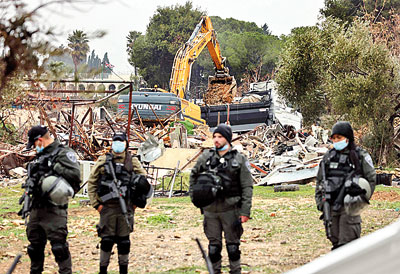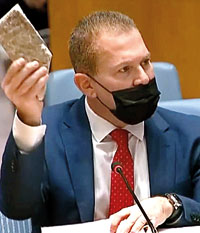Sunday Times 2
Battle for Palestine: Rocks and stones vs bulldozers and Apaches
UNITED NATIONS, (IPS) – When Israeli Ambassador Gilat Erdan made an unusual presentation before the Security Council displaying a large rock, which he claimed, was hurled at Israeli vehicles in the Occupied Territories, a reporter at a subsequent UN press conference asked whether Palestinians will be given the right of reply— by displaying in the Security Council chamber a machine gun or a bulldozer deployed by Israeli armed forces against civilian demonstrations.

The Palestinian Salhiya family's house was bulldozed by Israeli forces on Wednesday. AFP
Stephane Dujarric, the UN Spokesperson, provided a diplomatic response: “I’m not going to get into that… it’s not for me to speak.”
During a debate on January 19, Ambassador Erdan sharply criticised the “Security Council’s bias, and in particular, the Council’s utter disregard for Palestinian rock-throwing terrorism”. To make it clear that rocks are life-threatening weapons, Ambassador Erdan presented the Council with a rock to illustrate what was happening on the roads of Judea and Samaria and Jerusalem, asking the participants “how they would react if a similar rock was thrown at their vehicles”.
In 2021, he said, “Israelis suffered 1,775 rock attacks by Palestinian terrorists in addition to thousands of missiles, shootings, stabbings, and car ramming attacks”.
But for obvious reasons the rising Palestinian body count went unmentioned–nor Israeli military attacks on civilians.
Ian Williams, President of the Foreign Press Association in New York, told IPS having no sense of perspective is career plus for any Israeli representative at the UN.
“But Erdan seems to have forgotten his claimed history. King David felled Goliath with a stone and Erdan invites legitimate comparison between the Palestinian kids and the Israeli Goliath, poor and defenceless protected only by drones, missiles, planes and tanks from the rapacious stone throwers”. Israeli ambassadors have been getting away with this risible posturing for too long. It is time other delegates punctured their pretensions and challenged them–or just audibly hooted in derision, declared Williams, author of UNtold: The Real Story of the United Nations in Peace and War.
San Francisco University’s International Studies Professor Dr Stephen Zunes told IPS he does not recall stones ever being brought into a debate (in the UN Security Council), though there have certainly been props used before (i.e., US Secretary of State Colin Powell’s vial of anthrax, when he addressed the Security Council in 2003 on information and intelligence he believed showed the possibility of Iraq’s weapons of mass destruction, which eventually proved false).
“What I do find interesting is that the reporter chose to highlight the absurdity of a representative of a government–engaged in a foreign belligerent occupation which has been repeatedly cited for war crimes against the besieged population–would expect to be taken seriously in claiming they were justified in their repression out of fear of rocks,” said Dr Zunes.

Ambassador Erdan's rock stunt at UNSC
Dr Ramzy Baroud, a Palestinian author and editor of The Palestine Chronicle, told IPS Erdan was clearly aiming at creating a distraction from the horrific events transpiring in Sheikh Jarrah and throughout occupied East Jerusalem at the moment. He said the Salhiya family’s home was demolished on January 19, rendering 15 people, mostly children, homeless. A few days earlier, a heart-wrenching event took place, when members of the Salhiya family threatened to set themselves ablaze as they agonised over the imminent loss of their family home. “These events are being watched closely, first by Palestinians but also by people around the world. If the momentum of Israeli destruction continues, chances are we could witness another popular uprising. Erdan’s spectacle at the UN is a desperate act of preemptive propaganda to sway members of the international community from criticising Israel,” he noted.
“Moreover, criticising Palestinian weapons, however primitive or destructive, engages Israel in a misleading conversation that creates a moral equivalence between the occupier and the occupied, the colonialist and the colonised.”
Whether Palestinians use a stone, a gun or a clenched fist to resist and to defend themselves, Dr Baroud argued, their resistance is morally and legally justifiable. Israel, on the other hand, like all other military occupiers and colonialists, has neither a moral nor a legal argument to justify its oppression of Palestinians, the destruction of their homes and the killing of their children.
“Judging by the growing solidarity with Palestinians at all fronts, it is clear that Erdan’s sorry display is another exercise of political futility.”
The overwhelming Israeli firepower that continues to be unleashed on Palestinian militant groups in the longstanding battle in the Occupied Territories is perhaps reminiscent of Algeria’s war of independence (1954-1962) when France, the colonial power, used its vastly superior military strength to strike back at the insurgents with brutal ferocity
While France was accused of using its air force to napalm civilians, the Algerians were accused of using handmade bombs hidden in women’s handbags and left surreptitiously in restaurants and public places frequented by French nationals living in occupied territory.
In one of the memorable scenes in the 1967 cinematic classic “The Battle of Algiers,” which re-created Algeria’s war of independence against France, a handcuffed leader of the National Liberation Front (NLF), Ben M’Hidi, is brought before a group of highly-partisan French journalists for interrogation.
A journalist asks M’Hidi: “Don’t you think it is a bit cowardly to use women’s handbags and baskets to carry explosive devices that kill so many innocent people [in cafes and night clubs]?”
Responding with equal bluntness, the Algerian insurgent retorts: “And doesn’t it seem to you even more cowardly to drop napalm bombs on unarmed villages on a thousand times more innocent victims?”
“Of course, if we had your fighter planes, it would be a lot easier for us,” he adds. “Give us your bombers, and you can have our handbags and baskets.”
Like the Algerian insurgents, Palestinian militants were not fighting on a level battle field–as the Israeli military keeps unleashing its massive firepower on a virtually defenceless population in the Occupied Territories. On the looks of it, it was not a level battle field but an uneven killing field.
“Perhaps it would be interesting to see the roles reversed: the Palestinians with American fighter planes and battle tanks and the Israelis with homemade rockets,” says one Arab diplomat, striking a parallel with the Algerian insurgency. Besides F-16 fighter planes, the Israelis also used a wide array of U.S. weaponry, including Apache helicopters, M60 battle tanks, armored personnel carriers and heavy artillery. Israel’s prodigious military strength and its economic stability were attributed largely to unlimited US assistance and political support from American politicians.
This article contains extracts from a newly-released book (2021) on the United Nations–“No Comment – and Don’t Quote Me on That.” The book is available on Amazon and at the Vijitha Yapa bookshops.

